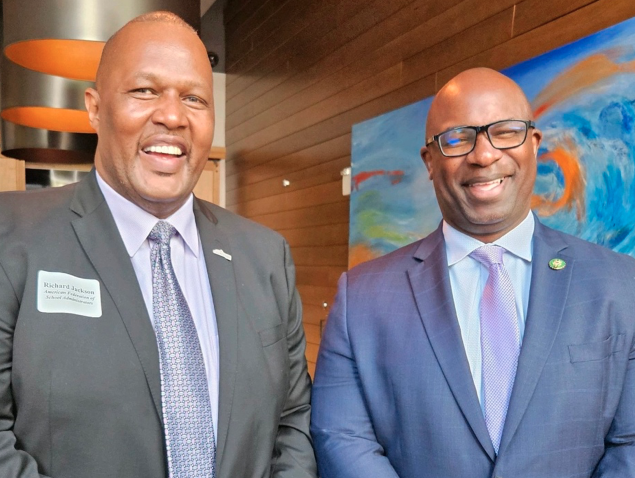U.S. Rep. Jamaal Bowman of New York recently met with Richard Jackson, the president of the Council of School Officers, AFSA Local 4, located in Washington, D.C. The discussion revolved around several critical issues confronting educators in this 2023–24 school year. According to Jackson, one of the primary topics Bowman and he addressed was the vital importance of maintaining funding for Title IIA.
Jackson emphasized, "Congressman Bowman expressed a strong preference for the continued support and training of school leaders." Unfortunately, Title IIA has faced challenges in recent months, as House Republicans have proposed eliminating all funding for the program in the forthcoming federal budget.
Jackson, who also serves as an AFSA vice president on the General Executive Board, voiced his concerns, stating, "If Title IIA is eliminated, it poses a significant threat to the entire education system and could have severe repercussions on our ability to help students reach their full potential." He also highlighted Bowman's unwavering dedication to educators, appreciating his steadfast commitment to their cause.
Bowman, a former AFSA member though the Council of School Supervisors & Administrators, AFSA Local 1, represents New York’s 16th District, which includes the Northern Bronx and parts of Westchester County, including Yonkers, New Rochelle and Mount Vernon.
“Unions are in my soul and in my spirit,” Bowman said. “My whole family benefited from unions, and everyone across the country deserves the same support and benefits that unions brought us.”
This year Bowman unveiled the More Teaching Less Testing Act, a proposal reflecting decades of educator and family-led advocacy and activism to align education with lifelong learning rather than with the standardized testing regime. This legislation takes critical steps to make classroom teaching time a priority over annual standardized test preparation and test administration.
“We need a revolution in our public schools that unlocks the brilliance of all our kids and cultivates a generation equipped to take on 21st century challenges,” said Bowman. “This means valuing diverse intelligence and fostering school cultures grounded in joyful, rigorous learning across a wide range of subjects and skills.
“We must end the overuse, abuse and misuse of standardized testing in our schools, and trade a broken metric for a system that empowers educators and communities to excite, inspire and challenge their students,” he said. “Our already underfunded schools should not be forced to spend valuable time and resources teaching to the test. Kids deserve experiential learning opportunities, and the time and space to play, discover and create. These pursuits cannot be bubbled in on a multiple-choice scan sheet.”
The More Teaching Less Testing Act scales back annual summative assessment requirements, gives states more flexibility through a new menu of assessment options, dramatically increases authorized funding for Title I schools to support educators and schools in meeting their students’ holistic needs, and supports balanced, innovative assessment systems that do not inappropriately punish students, teachers or schools based on a single test score.
Bowman supports building an education system that fosters and unlocks the unlimited gifts of our children. He says requiring states to annually assess every student disproportionately harms Black and brown students and students with disabilities, narrows the curricula to tested content, disempowers educators from leading authentically, and punishes schools by threatening to cut off funding or close schools.
“Educators should be empowered to use authentic, evidence-based formative assessment practices embedded within project-based, culturally competent and engaging learning opportunities that meet the needs of the whole child,” he said.
Additionally, Bowman indicated he would be reintroducing the Green New Deal for Public Schools Act in coming weeks. The legislation was first brought to Congress in 2021.
The Green New Deal for Public Schools Act—which aims to invest $1.43 trillion over 10 years in public schools and infrastructure to combat climate change—would make a transformative and unprecedented investment in public school infrastructure by upgrading every public school building in the country, addressing historical harms and inequities by focusing support on high-need schools, and hiring and training hundreds of thousands of additional educators and support staff.

